新编大学英语第二版第二册课文翻译
全新版大学英语第二版第二册Unit2课文译文及参考答案
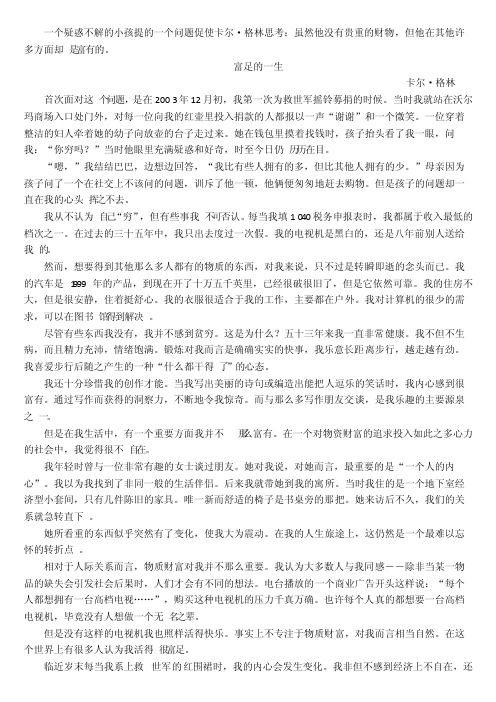
一个疑惑不解的小孩提的一个问题促使卡尔·格林思考:虽然他没有贵重的财物,但他在其他许多方面却是富有的。
富足的一生卡尔·格林首次面对这个问题,是在2003年12月初,我第一次为救世军摇铃募捐的时候。
当时我就站在沃尔玛商场入口处门外,对每一位向我的红壶里投入捐款的人都报以一声“谢谢”和一个微笑。
一位穿着整洁的妇人牵着她的幼子向放壶的台子走过来。
她在钱包里摸着找钱时,孩子抬头看了我一眼,问我:“你穷吗?”当时他眼里充满疑惑和好奇,时至今日仍历历在目。
“嗯,”我结结巴巴,边想边回答,“我比有些人拥有的多,但比其他人拥有的少。
”母亲因为孩子问了一个在社交上不该问的问题,训斥了他一顿,他俩便匆匆地赶去购物。
但是孩子的问题却一直在我的心头挥之不去。
我从不认为自己“穷”,但有些事我不可否认。
每当我填1040税务申报表时,我都属于收入最低的档次之一。
在过去的三十五年中,我只出去度过一次假。
我的电视机是黑白的,还是八年前别人送给我的。
然而,想要得到其他那么多人都有的物质的东西,对我来说,只不过是转瞬即逝的念头而已。
我的汽车是1999年的产品,到现在开了十万五千英里,已经很破很旧了,但是它依然可靠。
我的住房不大,但是很安静,住着挺舒心。
我的衣服很适合于我的工作,主要都在户外。
我对计算机的很少的需求,可以在图书馆得到解决。
尽管有些东西我没有,我并不感到贫穷。
这是为什么?五十三年来我一直非常健康。
我不但不生病,而且精力充沛,情绪饱满。
锻炼对我而言是确确实实的快事,我乐意长距离步行,越走越有劲。
我喜爱步行后随之产生的一种“什么都干得了”的心态。
我还十分珍惜我的创作才能。
当我写出美丽的诗句或编造出能把人逗乐的笑话时,我内心感到很富有。
Unit-6-Food新编大学英语第二版第二册课文翻译
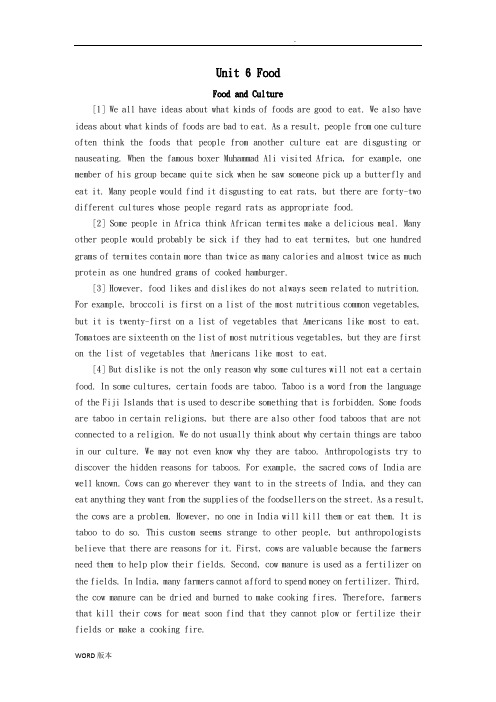
Unit 6 FoodFood and Culture[1] We all have ideas about what kinds of foods are good to eat. We also have ideas about what kinds of foods are bad to eat. As a result, people from one culture often think the foods that people from another culture eat are disgusting or nauseating. When the famous boxer Muhammad Ali visited Africa, for example, one member of his group became quite sick when he saw someone pick up a butterfly and eat it. Many people would find it disgusting to eat rats, but there are forty-two different cultures whose people regard rats as appropriate food.[2] Some people in Africa think African termites make a delicious meal. Many other people would probably be sick if they had to eat termites, but one hundred grams of termites contain more than twice as many calories and almost twice as much protein as one hundred grams of cooked hamburger.[3] However, food likes and dislikes do not always seem related to nutrition. For example, broccoli is first on a list of the most nutritious common vegetables, but it is twenty-first on a list of vegetables that Americans like most to eat. Tomatoes are sixteenth on the list of most nutritious vegetables, but they are first on the list of vegetables that Americans like most to eat.[4] But dislike is not the only reason why some cultures will not eat a certain food. In some cultures, certain foods are taboo. Taboo is a word from the language of the Fiji Islands that is used to describe something that is forbidden. Some foods are taboo in certain religions, but there are also other food taboos that are not connected to a religion. We do not usually think about why certain things are taboo in our culture. We may not even know why they are taboo. Anthropologists try to discover the hidden reasons for taboos. For example, the sacred cows of India are well known. Cows can go wherever they want to in the streets of India, and they can eat anything they want from the supplies of the foodsellers on the street. As a result, the cows are a problem. However, no one in India will kill them or eat them. It is taboo to do so. This custom seems strange to other people, but anthropologists believe that there are reasons for it. First, cows are valuable because the farmers need them to help plow their fields. Second, cow manure is used as a fertilizer on the fields. In India, many farmers cannot afford to spend money on fertilizer. Third, the cow manure can be dried and burned to make cooking fires. Therefore, farmers that kill their cows for meat soon find that they cannot plow or fertilize their fields or make a cooking fire.[5] Another example is that Americans do not eat dogs, although people from some other cultures regard them as good food. In the United States, dogs are very important to people as pets. They are usually regarded as part of the family, almost like a child in some cases. In addition, dogs have value as protection against criminals. Thieves will not usually enter a house where there is a dog because the dog will bark and possibly attack a stranger who is trying to get into a house. Apparently, the dog's place in society as a companion and as protection against criminals makes the dog taboo as food.[6] The taboo against eating pork occurs in more than one culture. There is some evidence that some ancient Egyptians did not eat pork. The ancient Israelites also regarded pork as taboo. One explanation for the pig-eating taboo is that pork that is not cooked sufficiently may spread a disease called trichinosis. However, most people no longer think that this is a good explanation for the pork taboo. Another explanation is that the Israelites were nomads—they were always moving from place to place. People have to stay in one place to raise pigs. The Israelites did not want to stay in one place because they did not want to change their culture. As a result, they did not eat pigs.[7] Anthropologists believe that most food likes and dislikes are a result of the ways of life of different people. Some people live in areas where there are both large animals and many insects. It is difficult for these people to kill large animals, and it requires a lot of energy. It is easier for them to use insects for food because it is not difficult to catch insects and it does not require a lot of energy. Nomadic people who move around will not want to keep pigs for food. People will not eat pets such as dogs. Americans eat a lot of beef because there is plenty of land for raising cattle and their meat can be shipped cheaply for long distances by railroads.饮食与文化1 对于什么样的食物好吃,我们都有自己的主见。
新编大学英语二2(第二册)课后翻译
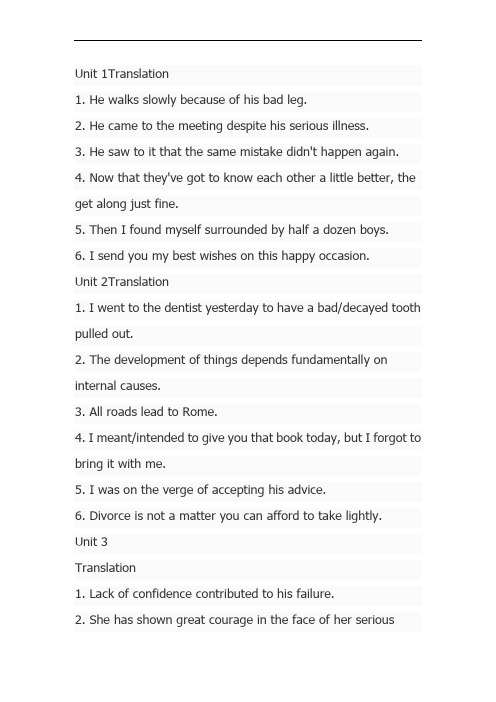
Unit 1Translation1. He walks slowly because of his bad leg.2. He came to the meeting despite his serious illness.3. He saw to it that the same mistake didn't happen again.4. Now that they've got to know each other a little better, the get along just fine.5. Then I found myself surrounded by half a dozen boys.6. I send you my best wishes on this happy occasion.Unit 2Translation1. I went to the dentist yesterday to have a bad/decayed tooth pulled out.2. The development of things depends fundamentally on internal causes.3. All roads lead to Rome.4. I meant/intended to give you that book today, but I forgot to bring it with me.5. I was on the verge of accepting his advice.6. Divorce is not a matter you can afford to take lightly.Unit 3Translation1. Lack of confidence contributed to his failure.2. She has shown great courage in the face of her seriousillness.3. We came to the conclusion that she was telling the truth.4. His secretary failed to tell him about the meeting.5. Learning languages isn't just a matter of memorizing words.6. Once she has made her decision, no one can hold her back.7. It'll be difficult to live up to the standards set by our captain.8. The scientist referred to this discovery as the most exciting new development in this field.Unit 4Translation1) All I can say is that we are extremely sorry.2) In many cases regulations alone will not work.3) He is highly likely to succeed because of his intelligence and diligence.4) She stared at me as if I were a stranger.5) It is reported that three people were injured in the traffic accident yesterday.6) I feel angry at the way he (has) treated me.7) The patient is much the same this morning as he was yesterday.8) I'd like to stay (at) home this evening rather than go out. Unit 5Translation1 You will see that what I am saying now will come true.2 The lecture was so boring that half (of) the students fell asleep.3 The problem of unemployment is tied up with the development of new technology.4 His appearance has changed so much that you may well not recognize him.5 The castle dates back to the 14th century.6 She has never done anything for them, whereas they have done everything they can for him.Unit 6Translation1. We regard him as one of the best players in the game.2. The scientist picked up those little pieces of rock and carefully put them into a box.3. The population of China is almost five times as large as that of the United States.4. The reason why grass is green was once a mystery to the little boy.5. She was standing by the window, apparently quite calm and relaxed.6. Profits have declined as a result of the recent drop in sales.7. She put on dark glasses as a protection against the strong light.8. He could no longer be trusted after that incident.Unit 7Translation1. If you sing the song several times, your children will (begin to) pick up the words.2. We tried to assure the nervous old man that flying/air travel was safe.3. An inadequate supply of vitamin A may lead to night blindness.4. I can use a computer, but when it comes to computer repairing, I know nothing about it.5. Many a mother tries to have her dreams realized by her daughter.6. The bad weather discouraged people from attending the parade.7. I gave him some pills to ease his pain.8. The job involves traveling/working abroad three months each year.Unit 8Translation1. I feel I should point out how dangerous it is.2. Their opinion will not affect my decision.3. When it comes to modern art, few people know more than Tom does.4. When asked, she confirmed that she was going to retire.5. The cough medicine tastes nice, but it doesn't do me much good.6. If we can't sell more goods, we'll have to cut back on the production.7. The film is all but three hours long.8. I assure you that it is true, lest anyone (should) think my story strange.Unit 9Translation1. All the arrangements should be completed prior to your departure.2. Such behavior may result in the executive being fired/asked to leave.3. Our products compete with those of other factories in terms of quality, reliability and aboveall, variety.4. The team's performance was greatly affected by the heavy rain.5. I appreciate your reasons for objecting to the proposal.6. To some extent, she should be responsible for the accident.7. I'm uneasy at/deeply troubled by the thought that life is just too comfortable.8. Women tend to live longer than men.Unit 10Translation1. We can go to the seven o'clock performance or theeight-whichever suits you best.2. Men are generally supposed to be strong, but most women know that the reverse is often true.3. He was released from prison after serving two years of a five-year sentence.4. You look equally nice in both dresses-I don't know which one to advise you to buy.5. This candidate has an impressively diverse range of interests and experience.6. The child suddenly let go of her hand and ran across the street.7. The result of the competition will depend largely on theopinions of the judges.8. I'm tired of you telling me what to do all the time。
Unit 2 Communication Problems新编大学英语第二版第二册课文翻译
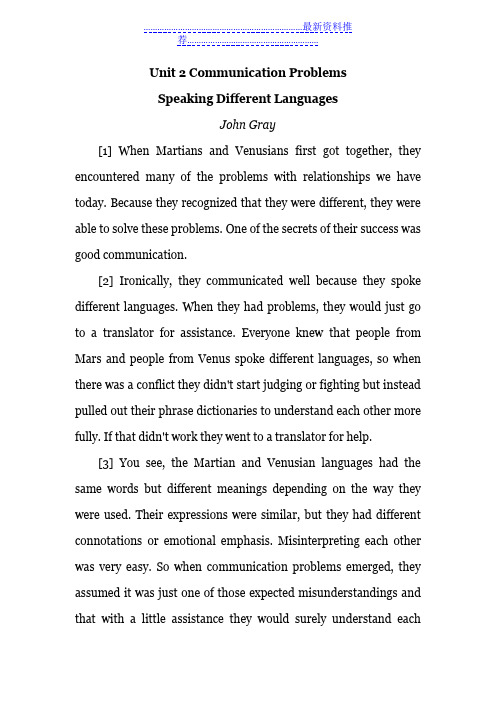
Unit 2 Communication ProblemsSpeaking Different LanguagesJohn Gray[1] When Martians and Venusians first got together, they encountered many of the problems with relationships we have today. Because they recognized that they were different, they were able to solve these problems. One of the secrets of their success was good communication.[2] Ironically, they communicated well because they spoke different languages. When they had problems, they would just go to a translator for assistance. Everyone knew that people from Mars and people from Venus spoke different languages, so when there was a conflict they didn't start judging or fighting but instead pulled out their phrase dictionaries to understand each other more fully. If that didn't work they went to a translator for help.[3] You see, the Martian and Venusian languages had the same words but different meanings depending on the way they were used. Their expressions were similar, but they had different connotations or emotional emphasis. Misinterpreting each other was very easy. So when communication problems emerged, they assumed it was just one of those expected misunderstandings and that with a little assistance they would surely understand eachother. They experienced a trust and acceptance that we rarely experience today.[4] Even today we still need translators. Men and women seldom mean the same things even when they use the same words. For example, when a woman says, “I feel like you never listen,” she does not expect the word “never” to be tak en literally. Using the word “never” is just a way of expressing the frustration she is feeling at the moment. It is not to be taken as if it were factual information.[5] To fully express their feelings, women would tend to exaggerate the facts a little bit for effect and use various superlatives, metaphors, and generalizations. Men mistakenly take these expressions literally. Because they misunderstand the intended meaning, they commonly react in an unsupportive manner. In the following chart ten complaints easily misinterpreted are listed, as well as how a man might respond unsupportively.Ten Common Complaints That Are Easily MisinterpretedWomen say things like this: Men respond like this:“We never go out.” “That's not true. We went out last week.”“Everyone ignores me.” “I'm sure some people notice you.”“I am so tired, I can't do anything.” “If you don't like your job,then quit.”“I want to forget everything.” “I don't think there's anything to forget.”“The house is always a mess.” “It's not always a mess.”“No one listens to me anymore.” “But I'm listening to you right now.”“Nothing is working.” “Are you saying it is my fault?”“You don't love me anymore.” “Of course I do. That's why I'm here.”“We are always in a hurry.” “We are not. Fr iday we were relaxed.”“I want more romance.” “Are you saying I am not romantic?”[6] You can see how a “literal” translation of a woman's words could easily mislead a man who is used to using speech as a means of conveying only facts and information. You can also see how a man's responses might lead to an argument. Unclear and unloving communication is the biggest problem in relationships. The number one complaint women have in relationships is: “I don't feel heard.”[7] Even this complaint is misunderstood and misinterpreted![8] A man's literal translation of “I don't feel heard” leads him to take the woman's complaint lightly. He thinks he has heard herif he can repeat what she has said. A correct translation of a woman saying “I don't feel heard” is: “I feel as though you don't fully understand what I really mean to say or care about how I feel. Would you show me that you are interested in what I have to say?”[9] If a man really understood her complaint, then he would argue less and be able to respond more positively. When men and women are on the verge of arguing, they generally misunderstand each other. At such times, it is important to rethink or translate what they have heard.说着不同的语言1 当火星人和金星人最初相聚时,也遇到了我们目前存在的许多人际关系问题。
Unit7Culture新编大学英语第二版第二册课文翻译
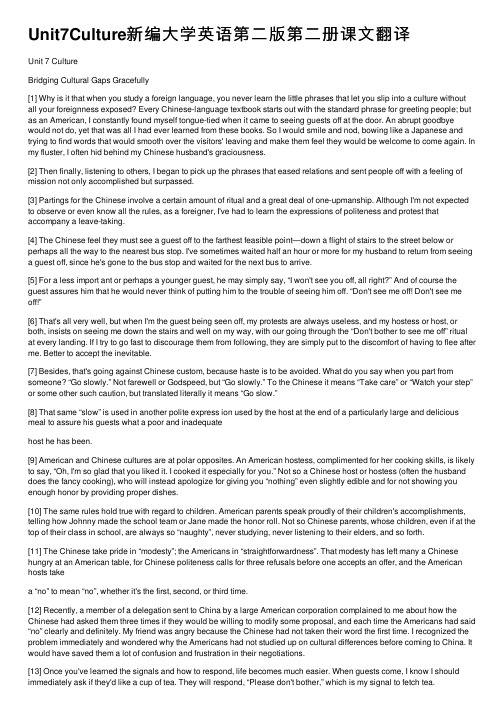
Unit7Culture新编⼤学英语第⼆版第⼆册课⽂翻译Unit 7 CultureBridging Cultural Gaps Gracefully[1] Why is it that when you study a foreign language, you never learn the little phrases that let you slip into a culture without all your foreignness exposed? Every Chinese-language textbook starts out with the standard phrase for greeting people; but as an American, I constantly found myself tongue-tied when it came to seeing guests off at the door. An abrupt goodbye would not do, yet that was all I had ever learned from these books. So I would smile and nod, bowing like a Japanese and trying to find words that would smooth over the visitors' leaving and make them feel they would be welcome to come again. In my fluster, I often hid behind my Chinese husband's graciousness.[2] Then finally, listening to others, I began to pick up the phrases that eased relations and sent people off with a feeling of mission not only accomplished but surpassed.[3] Partings for the Chinese involve a certain amount of ritual and a great deal of one-upmanship. Although I'm not expected to observe or even know all the rules, as a foreigner, I've had to learn the expressions of politeness and protest that accompany a leave-taking.[4] The Chinese feel they must see a guest off to the farthest feasible point—down a flight of stairs to the street below or perhaps all the way to the nearest bus stop. I've sometimes waited half an hour or more for my husband to return from seeinga guest off, since he's gone to the bus stop and waited for the next bus to arrive.[5] For a less import ant or perhaps a younger guest, he may simply say, “I won't see you off, all right?” And of course the guest assures him that he would never think of putting him to the trouble of seeing him off. “Don't see me off! Don't see meoff!”[6] That's all very well, but when I'm the guest being seen off, my protests are always useless, and my hostess or host, or both, insists on seeing me down the stairs and well on my way, with our going through the “Don't bother to see me off” ritual at every landing. If I try to go fast to discourage them from following, they are simply put to the discomfort of having to flee after me. Better to accept the inevitable.[7] Besides, that's going against Chinese custom, because haste is to be avoided. What do you say when you part from someone? “Go slowly.” Not farewell or Godspeed, but “Go slowly.” To the Chinese it means “Take care” or “Watch your step”or some other such caution, but translated literally it means “Go slow.”[8] That same “slow” is used in another polite express ion used by the host at the end of a particularly large and delicious meal to assure his guests what a poor and inadequatehost he has been.[9] American and Chinese cultures are at polar opposites. An American hostess, complimented for her cooking skills, is likely to say, “Oh, I'm so glad that you liked it. I cooked it especially for you.” Not so a Chinese host or hostess (often the husband does the fancy cooking), who will instead apologize for giving you “nothing” even slightly edible and for not showing you enough honor by providing proper dishes.[10] The same rules hold true with regard to children. American parents speak proudly of their children's accomplishments, telling how Johnny made the school team or Jane made the honor roll. Not so Chinese parents, whose children, even if at the top of their class in school, are always so “naughty”, never studying, never listening to their elders, and so forth.[11] The Chinese take pride in “modesty”; the Americans in “straightforwardness”. That modesty has left many a Chinese hungry at an American table, for Chinese politeness calls for three refusals before one accepts an offer, and the American hosts takea “no” to mean “no”, whether it's the first, second, or third time.[12] Recently, a member of a delegation sent to China by a large American corporation complained to me about how the Chinese had asked them three times if they would be willing to modify some proposal, and each time the Americans had said “no” clearly and definitely. My friend was angry because the Chinese had not taken their word the first time. I recognized the problem immediately and wondered why the Americans had not studied up on cultural differences before coming to China. It would have saved them a lot of confusion and frustration in their negotiations.[13] Once you've learned the signals and how to respond, life becomes much easier. When guests come, I know I should immediately ask if they'd like a cup of tea. They will respond, “Please don't bother,” which is my signal to fetch tea.从容得体德跨越⽂化沟壑1 在外语学习中,学会⼀些简单的词组就能让你不知不觉地进⼊另⼀种⽂化,⽽丝毫不暴露你作为⼀个外国⼈的⾝份,但你为什么总是学不会呢?每本汉语课本都,⼀律从问候语开始的。
Unit 4 Psychology in Our Daily Life新编大学英语第二版第二册课文翻译
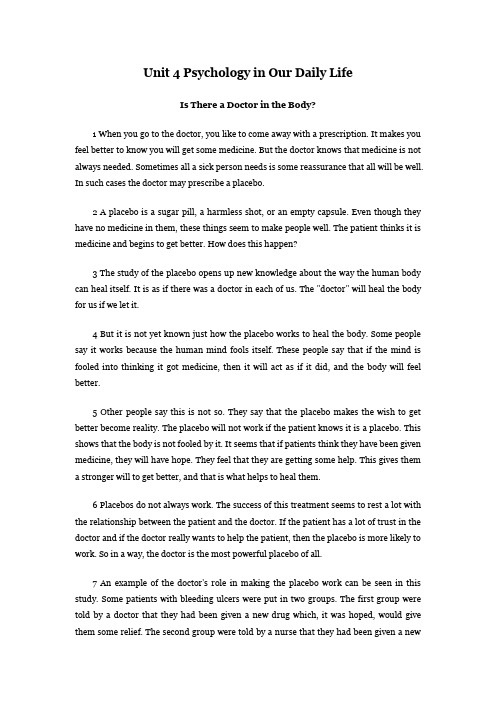
Unit 4 Psychology in Our Daily LifeIs There a Doctor in the Body?1 When you go to the doctor, you like to come away with a prescription. It makes you feel better to know you will get some medicine. But the doctor knows that medicine is not always needed. Sometimes all a sick person needs is some reassurance that all will be well. In such cases the doctor may prescribe a placebo.2 A placebo is a sugar pill, a harmless shot, or an empty capsule. Even though they have no medicine in them, these things seem to make people well. The patient thinks it is medicine and begins to get better. How does this happen?3 The study of the placebo opens up new knowledge about the way the human body can heal itself. It is as if there was a doctor in each of us. The "doctor" will heal the body for us if we let it.4 But it is not yet known just how the placebo works to heal the body. Some people say it works because the human mind fools itself. These people say that if the mind is fooled into thinking it got medicine, then it will act as if it did, and the body will feel better.5 Other people say this is not so. They say that the placebo makes the wish to get better become reality. The placebo will not work if the patient knows it is a placebo. This shows that the body is not fooled by it. It seems that if patients think they have been given medicine, they will have hope. They feel that they are getting some help. This gives them a stronger will to get better, and that is what helps to heal them.6 Placebos do not always work. The success of this treatment seems to rest a lot with the relationship between the patient and the doctor. If the patient has a lot of trust in the doctor and if the doctor really wants to help the patient, then the placebo is more likely to work. So in a way, the doctor is the most powerful placebo of all.7 An example of the doctor's role in making the placebo work can be seen in this study. Some patients with bleeding ulcers were put in two groups. The first group were told by a doctor that they had been given a new drug which, it was hoped, would give them some relief. The second group were told by a nurse that they had been given a newdrug but that not much was known about how it would work. As a result, 70 percent of the people in the first group got much better. Only 25 percent of the people in the second group got better. And both groups had in fact been given the same thing a placebo.8 The placebo has been found to work with a lot of different cases. It helps such things as seasickness, coughs, colds, and even pain after an operation. And there was an experiment done to see if a placebo could help old people stay healthy and live longer.9 The test was done in Romania with 150 people over the age of 60. They were put in three groups with 50 people in each group. The first group were given nothing at all. The second group were given a placebo. The third group were given a real drug and told that it would help with the problems of old age. (In fact, it was not a drug for old age at all.) The three groups were studied for many years. The first group showed no changes from the way old people in that village had always been. The second group (with the placebo) had much better health and a lower death rate. The third group (with the real drug) showed much the same results as the group that took the placebo.10 A placebo can also have bad effects. If patients expect a bad reaction to medicine, then they will also show a bad reaction to the placebo. This would seem to show that a lot of how you react to medicine is in your mind rather than in your body. Some doctors still think that if the placebo can have bad effects it should never be used. They think there is still not enough known about it.11 And yet, the use of the placebo has been well known for hundreds of years in other countries. Tribal doctors in some African countries have known for a long time that patients will get better if they think they are going to. Many of the "treatments" they use do not seem able to make a sick person better, and yet such treatments work.12 The strange power of the placebo does seem to suggest that the human mind is stronger than we think it is. There are people who say you can heal your body by using your mind. And the interesting thing is that even people who swear this is not possible have been healed by a placebo.人体内有医生吗?1 当你去看病时,你总希望走时能拿到一张药方。
新编大学英语1-2册课文翻译
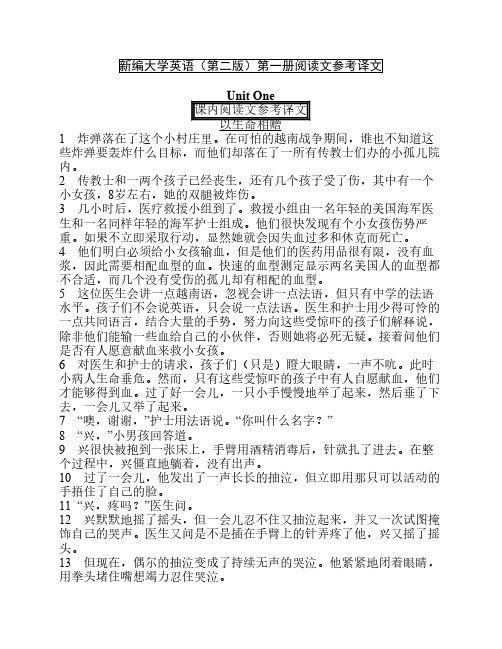
新编大学英语(第二版)第一册阅读文参考译文以生命相赠1 炸弹落在了这个小村庄里。
在可怕的越南战争期间,谁也不知道这些炸弹要轰炸什么目标,而他们却落在了一所有传教士们办的小孤儿院内。
2 传教士和一两个孩子已经丧生,还有几个孩子受了伤,其中有一个小女孩,8岁左右,她的双腿被炸伤。
3 几小时后,医疗救援小组到了。
救援小组由一名年轻的美国海军医生和一名同样年轻的海军护士组成。
他们很快发现有个小女孩伤势严重。
如果不立即采取行动,显然她就会因失血过多和休克而死亡。
4 他们明白必须给小女孩输血,但是他们的医药用品很有限,没有血浆,因此需要相配血型的血。
快速的血型测定显示两名美国人的血型都不合适,而几个没有受伤的孤儿却有相配的血型。
5 这位医生会讲一点越南语,忽视会讲一点法语,但只有中学的法语水平。
孩子们不会说英语,只会说一点法语。
医生和护士用少得可怜的一点共同语言,结合大量的手势,努力向这些受惊吓的孩子们解释说,除非他们能输一些血给自己的小伙伴,否则她将必死无疑。
接着问他们是否有人愿意献血来救小女孩。
6 对医生和护士的请求,孩子们(只是)瞪大眼睛,一声不吭。
此时小病人生命垂危。
然而,只有这些受惊吓的孩子中有人自愿献血,他们才能够得到血。
过了好一会儿,一只小手慢慢地举了起来,然后垂了下去,一会儿又举了起来。
7 “噢,谢谢,”护士用法语说。
“你叫什么名字?”8 “兴,”小男孩回答道。
9 兴很快被抱到一张床上,手臂用酒精消毒后,针就扎了进去。
在整个过程中,兴僵直地躺着,没有出声。
10 过了一会儿,他发出了一声长长的抽泣,但立即用那只可以活动的手捂住了自己的脸。
11 “兴,疼吗?”医生问。
12 兴默默地摇了摇头,但一会儿忍不住又抽泣起来,并又一次试图掩饰自己的哭声。
医生又问是不是插在手臂上的针弄疼了他,兴又摇了摇头。
13 但现在,偶尔的抽泣变成了持续无声的哭泣。
他紧紧地闭着眼睛,用拳头堵住嘴想竭力忍住哭泣。
14 现在医疗小组非常担忧,因为针不该使他们的小输血者一直感到疼痛。
新编大学英语第二册1-7单元课文翻译及课后答案
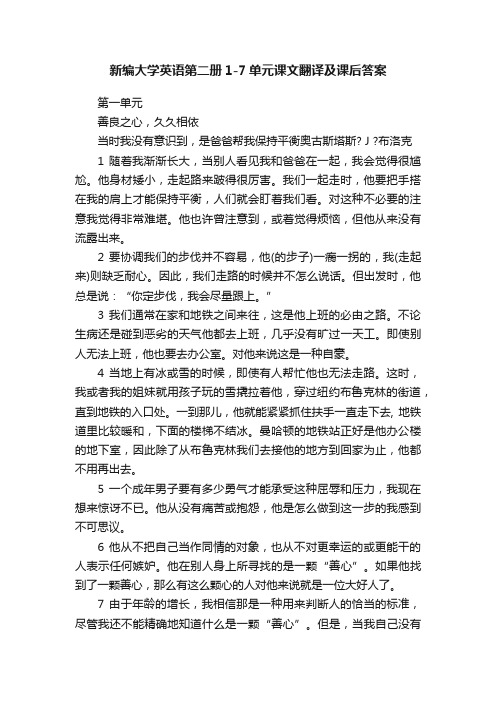
新编大学英语第二册1-7单元课文翻译及课后答案第一单元善良之心,久久相依当时我没有意识到,是爸爸帮我保持平衡奥古斯塔斯? J ?布洛克1 随着我渐渐长大,当别人看见我和爸爸在一起,我会觉得很尴尬。
他身材矮小,走起路来跛得很厉害。
我们一起走时,他要把手搭在我的肩上才能保持平衡,人们就会盯着我们看。
对这种不必要的注意我觉得非常难堪。
他也许曾注意到,或着觉得烦恼,但他从来没有流露出来。
2 要协调我们的步伐并不容易,他(的步子)一瘸一拐的,我(走起来)则缺乏耐心。
因此,我们走路的时候并不怎么说话。
但出发时,他总是说:“你定步伐,我会尽量跟上。
”3 我们通常在家和地铁之间来往,这是他上班的必由之路。
不论生病还是碰到恶劣的天气他都去上班,几乎没有旷过一天工。
即使别人无法上班,他也要去办公室。
对他来说这是一种自豪。
4 当地上有冰或雪的时候,即使有人帮忙他也无法走路。
这时,我或者我的姐妹就用孩子玩的雪撬拉着他,穿过纽约布鲁克林的街道,直到地铁的入口处。
一到那儿,他就能紧紧抓住扶手一直走下去, 地铁道里比较暖和,下面的楼梯不结冰。
曼哈顿的地铁站正好是他办公楼的地下室,因此除了从布鲁克林我们去接他的地方到回家为止,他都不用再出去。
5 一个成年男子要有多少勇气才能承受这种屈辱和压力,我现在想来惊讶不已。
他从没有痛苦或抱怨,他是怎么做到这一步的我感到不可思议。
6 他从不把自己当作同情的对象,也从不对更幸运的或更能干的人表示任何嫉妒。
他在别人身上所寻找的是一颗“善心”。
如果他找到了一颗善心,那么有这么颗心的人对他来说就是一位大好人了。
7 由于年龄的增长,我相信那是一种用来判断人的恰当的标准,尽管我还不能精确地知道什么是一颗“善心”。
但是,当我自己没有的时候,我是知道的。
8 尽管很多活动我爸爸不能参加,但他还是尽量用某种方式参与。
当本地的一支棒球队发现缺经理的时候,他使它维持下去。
他是一个很懂行的棒球迷,经常带我去埃贝茨球场看布鲁克林的道奇队打球。
- 1、下载文档前请自行甄别文档内容的完整性,平台不提供额外的编辑、内容补充、找答案等附加服务。
- 2、"仅部分预览"的文档,不可在线预览部分如存在完整性等问题,可反馈申请退款(可完整预览的文档不适用该条件!)。
- 3、如文档侵犯您的权益,请联系客服反馈,我们会尽快为您处理(人工客服工作时间:9:00-18:30)。
一善良之心,久久相依当时我没有意识到,是爸爸帮我保持平衡奥古斯塔斯• J •布洛克1 随着我渐渐长大,当别人看见我和爸爸在一起,我会觉得很尴尬。
他身材矮小,走起路来跛得很厉害。
我们一起走时,他要把手搭在我的肩上才能保持平衡,人们就会盯着我们看。
对这种不必要的注意我觉得非常难堪。
他也许曾注意到,或着觉得烦恼,但他从来没有流露出来。
2 要协调我们的步伐并不容易,他(的步子)一瘸一拐的,我(走起来)则缺乏耐心。
因此,我们走路的时候并不怎么说话。
但出发时,他总是说:“你定步伐,我会尽量跟上。
”3 我们通常在家和地铁之间来往,这是他上班的必由之路。
不论生病还是碰到恶劣的天气他都去上班,几乎没有旷过一天工。
即使别人无法上班,他也要去办公室。
对他来说这是一种自豪。
4 当地上有冰或雪的时候,即使有人帮忙他也无法走路。
这时,我或者我的姐妹就用孩子玩的雪撬拉着他,穿过纽约布鲁克林的街道,直到地铁的入口处。
一到那儿,他就能紧紧抓住扶手一直走下去, 地铁道里比较暖和,下面的楼梯不结冰。
曼哈顿的地铁站正好是他办公楼的地下室,因此除了从布鲁克林我们去接他的地方到回家为止,他都不用再出去。
5 一个成年男子要有多少勇气才能承受这种屈辱和压力,我现在想来惊讶不已。
他从没有痛苦或抱怨,他是怎么做到这一步的我感到不可思议。
6 他从不把自己当作同情的对象,也从不对更幸运的或更能干的人表示任何嫉妒。
他在别人身上所寻找的是一颗“善心”。
如果他找到了一颗善心,那么有这么颗心的人对他来说就是一位大好人了。
7 由于年龄的增长,我相信那是一种用来判断人的恰当的标准,尽管我还不能精确地知道什么是一颗“善心”。
但是,当我自己没有的时候,我是知道的。
8 尽管很多活动我爸爸不能参加,但他还是尽量用某种方式参与。
当本地的一支棒球队发现缺经理的时候,他使它维持下去。
他是一个很懂行的棒球迷,经常带我去埃贝茨球场看布鲁克林的道奇队打球。
他喜欢参加舞会和聚会,就是坐在一旁观看,也很开心。
9 有一件事我至今难忘。
一次沙滩聚会上,人们打了起来,每个人都在推推搡搡,拳头你来我往。
于是他无法袖手旁观,但没有人帮忙,在松软的沙滩上他站不起来。
困窘之际,他开始大叫:“谁坐到我这儿来,我就跟他打!谁坐到我这儿来,我就跟他打!”10 没人坐下和他打。
但是第二天,人们都和他开玩笑说,拳击尚未开始,对手就故意认输了,这还是第一次。
11 我现在才明白,有些事他是通过我,他唯一的儿子,间接参与的。
当我打球(打得很糟糕)的时候,他也在“打”。
我加入海军,他也“加入”。
当我休假回家的时候,他总要我去他的办公室。
在介绍我的时候,他实际上是在说:“这是我的儿子,但也是我。
如果不是这种情形的话,我也能做这些。
”可是这些话从没有说出来。
12 父亲已去世多年。
但我还是经常想起他。
不知道他当时是否感觉到了我曾不愿意别人看见我和他走在一起。
如果他感觉到了,我很遗憾我从没有告诉过他后来我感到多么难过,多么渺小,多么后悔。
每当我为琐事抱怨的时候,每当我嫉妒别人好运的时候,每当我没有一颗“善心”的时候,就想起了他。
13 在这种时候,我就把手放在他的手臂上,来重新获得平衡,并说:“你定步伐,我会尽量跟上。
”二说着不同的语言===1 当火星人和金星人最初相聚时,也遇到了我们目前存在的许多人际关系问题。
他们之所以能够解决这些问题是因为他们认识到相互之间的差异。
他们成功的秘诀之一就是良好的交流沟通。
2 具有讽刺意味的是,他们交流沟通的成功却是因为他们说着不同的语言。
当他们遇到问题时,就去找翻译帮助。
众所周知,他们每个人都清楚火星人和金星人语言不同,因此,一旦遇到冲突,他们并不去评论是非或争斗,相反,他们会掏出自己的短语词典,以便更全面地理解对方。
如果这样无效的话,他们就去找翻译帮助。
3 你明白吗?你知道,火星语和金星语用的词相同,但是所表达的含义却不同,这要根据词的用法来决定。
两种语言的措词尽管相似,但是措辞的内涵却不同,所侧重的情感也不同。
相互之间很容易误解。
因此,当交谈出现问题时,他们推断这只不过是一个误解而已,是预料中的,只要得到些许帮助他们就必定能够彼此理解。
他们体验到的是一种相互间的信任和认同,这是我们今天很少能体验到的。
4 即使在今天,我们依然需要翻译。
男人和女人即便用词相同,他们所表达的含义也很少相同。
例如:当女人说:“我觉得你从不听我说话,”她希望对方不要从字面上理解“从不”这个词。
使用“从不”这个词只不过是用来表达她此时此刻感到非常失望。
不要把它当作真实的意思来理解。
5 为了充分表达她们的感受,女人们往往会把事实夸大一点以引起注意,并使用各种最高级,隐喻以及推论。
男人错误地从字面上来理解这些用语。
他们误解了女人想要表达的意思,便常常以不赞同的态度,来回答她们。
下面列有十句女人的抱怨话,这些都是很容易被男人误解的,同时也列出了男人以不赞同的态度可能做出的回答。
容易被男人误解十种抱怨==女人这样说:男人这样回答:==“我们从不一起出去。
” “不对,我们上周还出去过。
”==“所有人都不理睬我。
” “我敢肯定有人关注你。
”==“我太累了,我什么也干不了了。
” “要是你不喜欢自己的工作,那就辞职。
” ==“我讨厌所有的一切。
” “我没觉得有什么让你讨厌的。
”==“家里总是乱七八糟。
” “并不总是这么乱。
”==“再也没人听我说话了。
” “我不正在听你说嘛。
”==“没有一样东西管用。
”“你是说这都是我的错?”==“你不再爱我了。
”“当然爱你,要不我干嘛还在这儿。
”==“我们老是处于匆忙状态。
”“没有,周五我们刚轻松过。
”==“我需要更多的爱情。
”“你是说我不够多情?”6 可以看出,习惯于把语言用作传达事实和信息手段的男人们,从“字面”上去理解女人的话是怎样易于产生误解的。
也可以看出,男人的回答又是怎样引起争吵的。
含糊的、缺乏爱心的交流沟通是男女之间的最大问题。
女人们在交往中的第一大抱怨是“我觉得没人听见我说的话。
”7 即使这种抱怨也会被误解和曲解。
8 男人从字面上去理解“我觉得没人听见我说的话”,这使他漠然地对待该抱怨。
他认为只要他能重复说出她的话就表明他听到她所说的话了。
对于女人所说的“我觉得没人听我说话”的正确理解是:“我觉得好像你没有完全理解我真正想说的话,或者你不关心我的感受。
你能不能表示一下你对我非说不可的话感兴趣呢?”9 如果男人能真正理解她的抱怨,那么他就会少些争吵,就能更积极地做出反应。
当男人和女人到了要争吵的地步时,他们往往是误解了对方的意思。
这时候,重新考虑和解释自己所听到的话是很重要的。
三花钱的心理=1 你是花钱成瘾,还是尽可能守着钱不花?你专爱买便宜货吗?你是愿意使用信用(赊欠)账户还是支付现金?你对这些问题的回答能反映出你的个性。
根据心理学家的观点,我们每个人的花钱习惯,不仅体现我们的信仰、价值观,而且还跟过去存在的问题有关。
2 心理学家相信对许多人来说,钱是力量和支配力的重要象征。
丈夫抱怨妻子的花钱习惯,可能就是因为害怕失去自己在婚姻中的权威。
反过来,妻子可能会因为生丈夫的气而大笔大笔地乱花钱。
此外,许多人把钱看成是爱的象征。
他们把钱花在家人、朋友身上以表达对他们的爱,或者为自己购买昂贵的礼物,因为自己也需要爱。
3 人们可能会痴迷于不同的事物――例如,烈酒、毒品,某些食物,甚至电视节目。
有这些癖好的人就是上了瘾,也就是说,他们有着强烈的心理需求,他们认为这种需求必须得到满足。
按照心理学家的说法,许多人购物成癖,他们觉得自己必须把钱花出去。
跟其他癖好相似,这种欲望是非理性的——不可能做出合理的解释。
对那些赊账购物成癖的人而言,信用账户比现金更为刺激。
换句话说,购物成癖的人认为,借助赊账,他们可以无所不为。
他们从大笔花钱时体验到的乐趣,实在是比从所购物品中获得的乐趣大得多。
4 甚至还有四处搜寻便宜货的特殊心理。
当然,要省钱多数人会去光顾大甩卖、廉价物和折扣商品。
然而,购买便宜货成癖的人经常仅仅因为价廉而买一些自己不需要的东西。
他们愿意相信这是在给自己省钱,但事实上他们是在玩一场很刺激的游戏:当他们能买到比别人便宜的东西时,他们觉得自己是赢家。
专家断言,大多数人对于自己的行为都有两种解释:一个是他们行事的正当理由,另一个是真正原因。
5 当然,不只是科学家了解消费习惯方面的心理因素,商人也了解。
商店、公司和广告商都利用心理因素来增加营业额:他们在广告宣传和决定产品的推销方法时会考虑,人们对于爱、权力或支配力的需求,人们的基本价值观、信仰和观点。
6 心理学家常常用一种被称为“行为疗法”的手段来帮助个人解决其性格上的问题。
用这种方法,他们能帮助那些感到自己在花钱方面存在问题的人,他们会给这些人“布置任务”。
例如,如果一个人每到一个商店都要买点什么,治疗专家就会教他这样来约束自己:在治疗的第一天,他必须去一家商店,呆五分钟再离开。
第二天,他要呆上十分钟,并试试某种商品。
第三天,他要呆上十五分钟,向售货员问个问题,但什么都不买。
不久,他就会发现什么都不买,对自己不会有什么不好的事情发生。
这样,他就能改掉购物成癖的毛病了。
如何消除排队的怒火===1 如果这个假期你在机场或车站排长队,你是去分析一下到底是排队的什么方面使你恼火呢?还是只会冲着身边的管理人员发脾气?2 理查德·拉森教授是麻省理工学院的电气工程师,他也讨厌排队。
但是他并未因此而怒发冲冠,相反地他决定要研究这个课题。
他的第一个研究结果表明,人们恼怒的程度与等待时间的长短并不直接相关,这也验证了美国国家科学基金会的早期研究。
他引用休斯顿机场的实验为例。
在休斯顿机场,乘客们下飞机之后走到行李提取处得用一分钟,然后再等七分钟才能领到行李。
对此旅客怨声不断,尤其是那些等候领取行李的乘客,他们眼睁睁地看着那些只带着手提行李的旅客可以马上走出机场,而自己却要等上七分钟。
3 机场当局决定加长乘客下飞机后的步行距离,这样,走到行李提取处需要六分钟,而不再是快速行走一分钟就能到达。
等他们最终来到行李提取处,只需要等待两分钟。
那些只带着手提行李的乘客为此却多耽误了五分钟,可是旅客们的抱怨几乎下降为零。
4 原因是什么?拉森指出,这一切都与他称之为“社会公正”的现象有关。
人们看到别人抄近路,就会觉得自己的等待难以忍受。
因此,对于机场来说,让每个人都耽误一下的做法是可取的。
5 拉森研究的另一个侧面是,他观察到:如果不告知人们发生了什么,他们就会变得更加不满。
那些知道会耽搁半小时的乘客会比那些莫名其妙等候二十分钟的乘客情绪要好一些。
6 但是即使知道了我们得等多长时间也不能解决所有问题。
我们还必须相信人们正在采取一切措施来减少耽误的时间。
拉森引用了美国两家相邻的银行为例。
一家高度计算机化,为每个顾客服务的时间平均为30秒。
